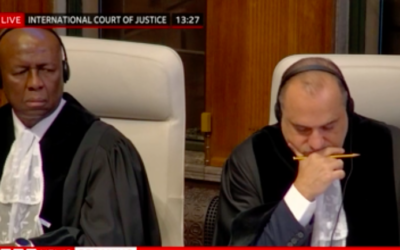The International Court of Justice has ruled that Israel must “take all measures within its its power” to prevent acts within the scope of the genocide convention.
But the United Nation’s top court in The Hague did not, as some had predicted, call for an immediate halt to Israel’s war on Hamas in Gaza. And neither did it call for Israel to withdraw from Gaza.
In an interim ruling, announced on Friday, the president of the ICJ Joan Donoghue called on Israel to take steps to alleviate the suffering of the population in Gaza.
Get The Jewish News Daily Edition by email and never miss our top stories
Free Sign Up
“The state of Israel shall… take all measures within its power to prevent the commission of all acts within the scope of Article II of the Genocide convention,” the court said.
In response to the ruling Israeli PM Benjamin Netanyahu said the ICJ had recognised his country’s right to self-defence, but he said the charge of genocide should not have been debated.
The ICJ said Israel must ensure “with immediate effect” that its forces do not commit any of the acts covered by the convention.
Israel was told it must submit a report to the court on all the measures taken in response to this order within one month from now.
While large majority of the 17-judge panel of the ICJ voted for urgent measures which covered most of what South Africa it was notable they fai8led to order a halt to Israeli military action in Gaza.
South Africa had asked the court for an immediate ceasefire. It insisted the ICJ’s preliminary ruling represented a “decisive victory.”
Israel’s national security minister Itamar Ben-Gvir responde to the ruling by tweeting, ironically “Hague Shmague.”
The Palestinian Foreign Ministry said it welcomed the ruling, calling it an “important reminder no state is above the law,”
A Hamas official reportedly called for “forcing the occupation to implement ICJ decision.”
The court also expressed “grave concerns” about the fate of the hostages kidnapped by Hamas in Gaza.
Donoghue opened Friday’s proceedings stating the court needed to decide if it was within its jurisdiction to rule on South Africa’s charges.
Donoghue said that the United Nation’s world court is deeply concerned about the continued loss of life in Gaza.
She added:”At least some acts appear to be capable of falling with the genocide convention.”
Israel had been preparing for the possibility that the ICJ in The Hague would issue a series of temporary orders against it and its activities in Gaza.
ICJ at The Hague
The legal threshold required for making these decisions not high, while the legal process, which is in a preliminary stage, is designed to ensure that the rights of the parties in the petition are preserved, in preparation for a trial that may last years.
The ICJ dismissed Israel’s call for the case to be removed, and judged there was a dispute between the Jewish state and South Africa, giving the court jurisdiction to rule on it.
“The court considers that it cannot accede to Israel’s request that the case be removed from the general list,” Judge Donoghue said.
The judge also read out inflammatory quotes in relation to the war on Hamas from Israeli ministers including Yoav Gallant and Isaac Herzog.
Gallant said he had released all restrictions on fighting against “human animals”, adding: “We will eliminate everything.”
Donoghue continues by reading comments made by Israeli President Isaac Herzog three days later in which he said the military was working according to the rules of international law.
“We are at war,” he says, adding that civilians in Gaza “could have risen up” to remove Hamas, which rules in Gaza.
Donoghue says the court considered that the civilian population in Gaza remains extremely vulnerable.
She noted that the Israeli military operation is ongoing and that the prime minister has said the war will take “many months”.
Israel had also said it has taken efforts to mitigate harm against civilians, the court noted, but while such steps “are to be encouraged”, the judge says they’re not enough.
Israeli and Palestinian supporters gathered outside the Peace Palace ahead of Friday’s hearing at The Hague, with police keeping them apart.
South Africa filed a case against Israel before the court in December, alleging that the war against Hamas, which has killed 25,700 people, amounts to state-led genocide and stands in breach of the UN’s genocide convention, signed in 1948 as the world’s response to the Holocaust.

Lawyers at the ICJ
The trial began on January 11 with eight representatives from the South African legal team delivering their opening statements.











